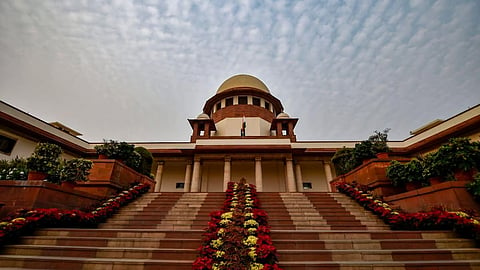

NEW DELHI: Chief Justice D.Y. Chandrachud, who is set to demit office on November 10, on Wednesday deferred the hearing by four weeks on the batch of pleas challenging the immunity granted to husbands in cases of marital rape.
The case is now expected to be heard by a new bench after November 20, as CJI Chandrachud would have retired by then.
The Chief Justice noted that he would not be able to conclude the hearing and deliver a verdict before the Supreme Court closes for the Diwali vacation. Along with CJI Chandrachud, the bench comprised Justices J.B. Pardiwala and Manoj Misra.
During the hearing, lawyers for the petitioners submitted that each would require a day to argue.
Senior lawyer Gopal Sankaranarayanan, representing one of the petitioners, said he would need one day. Following this, the CJI observed that Senior Advocate Indira Jaising and other counsel would also require a day each. "Hence, it will not be possible to complete the hearing in the foreseeable future," the CJI remarked.
The bench said that the matter would be heard by a new bench in four weeks.
The Supreme Court was hearing several pleas challenging the constitutional validity of provisions in the Indian Penal Code (IPC) and the Bharatiya Nyaya Sanhita (BNS), which grant immunity from prosecution to husbands accused of rape if they force their wives, who are not minors, to have sex.
Earlier, the apex court had sought the petitioners' views on the Centre's submission that making such acts punishable would have significant impacts on conjugal relationships and cause serious disturbances in the institution of marriage.
In an affidavit filed on October 3, the Central government opposed the criminalisation of marital rape, arguing that "suitably designed punitive measures" are already in place for this sensitive issue. "We see no necessity to criminalise marital rape as there are already suitably designed punitive measures in place," the Union of India (UoI) told the court.
The Centre argued that the issue was primarily social rather than legal. Opposing the batch of pleas, the UoI said, "Criminalising marital rape would have significant implications for society. The jurisdiction to criminalise such acts (marital rape) lies with the legislature, not the Supreme Court."
It further added that this issue is not only a constitutional question but also a social one, on which Parliament, having considered all opinions, took a position. In 2013, Parliament had retained Exception 2 to Section 375 of the IPC during amendments to the section.
The affidavit warned that striking down Exception 2 could have far-reaching consequences for the institution of marriage. "It may severely impact conjugal relationships and cause serious disturbances in the institution of marriage. In the fast-changing social and family structure, misuse of amended provisions cannot be ruled out, as proving consent would be difficult and challenging," the Centre said.
The Union government maintained that the issue of marital rape could not be decided without proper consultation with all stakeholders.
Several petitions were pending before the top court, including one from the All India Democratic Women's Association (AIDWA), challenging the marital rape exception under the new criminal laws.
A two-judge bench of the Delhi High Court had delivered a split verdict on May 12, 2022, regarding the criminalisation of marital rape. Justice Rajiv Shakdher ruled in favour of criminalising it, while Justice C. Hari Shankar disagreed, holding that Exception 2 to Section 375 did not violate the Constitution as it was based on intelligible differences.
Following the Delhi High Court’s verdict, multiple petitions were filed in the Supreme Court, challenging the decision and seeking orders to criminalise marital rape.